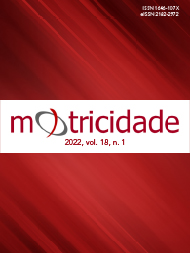Motor Skills of Healthy Children Aged six to 12 Years: Systematic Review
DOI:
https://doi.org/10.6063/motricidade.23223Keywords:
motor skills, child, schoolchildren, sexAbstract
The present research aimed to analyze the motor skills of healthy children aged six to 12 years, identify potential factors associated with deficits in motor performance and synthesize the instruments used for assessment. The descriptors used were: healthy child; healthy children; motor skills; psychomotor performance and motor performance in English, Portuguese and Spanish in Scielo, Lilacs and Pubmed databases. Two independent reviewers performed the study selection, data extraction and methodological quality analysis. The search was restricted to original articles from observational studies published between 1997 and 2018. The methodological quality of the studies was assessed using the Joanna Briggs Institute (JBI) instruments. Results: In the initial search, 4746 references were found, and 165 full articles were read, resulting in 11 articles for fine review after using the exclusion criteria. The girls showed worse performance. The instruments used were: Test for Gross Motor Development Second Edition (TGMD-2); Koperkoordination test fur Kinder (KTK); Movement Assessment Battery for Children Second Edition (MABC-2); and Movement Assessment Battery for Children Second Edition (MABC). TGMD-2 and KTK assess gross motor skills, whereas the MABC and MABC-2 tests also assess fine motor skills. This literature review showed that the motor skills of healthy children aged 6 to 12 years were considered satisfactory in five studies and that six children had a motor delay. The most frequent was the Test of Gross Motor Development Second Edition (TGMD-2).
Systematic Review Record: PROSPERO CRD42017067634.
Keywords: motor skills; child; schoolchildren; sex.
Downloads
Published
Issue
Section
License
The authors of submitted manuscripts must transfer the full copyright to Journal Motricidade / Desafio Singular Editions. Granting copyright permission allows the publication and dissemination of the article in printed or electronic formats and copyrights start at the moment the manuscript is accepted for publication. It also allows Journal Motricidade to use and commercialize the article in terms of licensing, lending or selling its content to indexation/abstracts databases and other entities.
According to the terms of the Creative Commons licence, authors may reproduce a reasonable number of copies for personal or professional purpose but without any economic gains. SHERPA/RoMEO allows authors to post a final digital copy (post-printing version) of the article in their websites or on their institutions' scientific repository.


